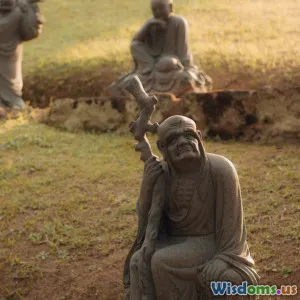
7 Powerful Life Lessons Hidden in the Tao Te Ching
9 min read Explore seven profound life lessons from the Tao Te Ching that inspire balance, resilience, and harmony in daily living. (0 Reviews)
7 Powerful Life Lessons Hidden in the Tao Te Ching
The Tao Te Ching, an ancient Chinese classic attributed to the sage Laozi, is a masterpiece of philosophical thought. Though written more than 2,500 years ago, its enduring wisdom resonates deeply, inviting readers to explore the fundamental nature of existence, balance, and self-mastery. But beyond lofty metaphysics, the Tao Te Ching carries life lessons that are profoundly practical and actionable.
Whether you are looking for guidance in navigating modern complexities or seeking a deeper connection to yourself and the world, these seven life lessons derived from the Tao Te Ching offer timeless tools to enrich your journey.
1. Embrace the Power of Wu Wei: Effortless Action
One of the most celebrated concepts in the Tao Te Ching is wu wei, often translated as "non-action" or "effortless action." But what does this really mean in life?
Wu wei encourages alignment with the natural flow of events instead of forcefully struggling against them. This does not imply passivity; rather, it is about knowing when to act and when to yield.
"The master does nothing, yet nothing is left undone." – Laozi
Real-world Insight:
Imagine a kayaker moving downstream. Paddling hard against the current is exhausting and ineffective, but using the river’s flow to navigate with grace requires being attentive and responsive instead of confrontational.
In daily life, practicing wu wei might mean:
- Letting go of unnecessary control when circumstances are beyond your influence.
- Trusting intuition or circumstances to guide your actions organically.
- Reducing stress by avoiding needless resistance against change.
Modern psychology echoes this: research into mindfulness and flow states shows better outcomes when people engage with tasks in an open, adaptable rather than rigid way.
2. Value Humility Over Aggression
The Tao Te Ching praises humility as a virtue integral to strength. The paradoxical strength of softness, yielding, and modesty can disarm conflict and foster lasting influence.
"Nothing in the world is as soft and yielding as water. Yet for dissolving the hard and inflexible, nothing can surpass it." – Laozi
Example in Leadership:
Many contemporary leadership models emphasize emotional intelligence and humility. Leaders who listen more than they impose often inspire loyalty and cooperation. When people feel heard and respected, teams thrive.
Historical figures like Mahatma Gandhi exemplify the power of humble resistance.
3. Cultivate Simplicity and Contentment
The Tao Te Ching advocates returning to simplicity as a path to peace and fulfillment.
"Manifest plainness, Hold fast to authenticity, Reduce selfishness, Have few desires." – Laozi
Supporting Data:
Minimalism has surged as a lifestyle choice because studies link reduced material possessions with decreased anxiety and enhanced well-being. Overconsumption often leads to stress and dissatisfaction, whereas embracing simplicity sharpens focus on what really matters.
Whether decluttering physical spaces or paring down mental clutter, simplicity aligns with the Taoist path.
4. Recognize the Interconnectedness of All Things
The Taoist philosophy underlines the unity and interconnectedness in the universe. Everything is part of a seamless whole, and dichotomies like good and bad, success and failure, are relative and interdependent.
"When people see some things as beautiful, other things become ugly. When people see some things as good, other things become bad." – Laozi
Practical Implications:
This lesson fosters compassion and tolerance by encouraging us to perceive beyond binary thinking. For example, sustainability movements benefit from such holistic perspectives, understanding how ecosystems, economies, and communities overlap.
Understanding interconnectedness can decrease judgment and increase empathy in personal and societal contexts.
5. Practice Patience and Allow Growth to Unfold
Patience is a subtle theme woven throughout the Tao Te Ching. The rhythm of nature, seasons, and growth processes offers a metaphor for human development and life challenges.
"Nature does not hurry, yet everything is accomplished." – Laozi
Modern Context:
In a culture obsessed with instant results and gratification, Taoist patience teaches endurance. Whether recovering from setbacks or learning new skills, recognizing that transformation is gradual reduces frustration and promotes resilience.
Psychological research similarly recognizes patience as linked to better decision making, health, and interpersonal relationships.
6. Harness the Strength of Softness and Flexibility
Unlike Western notions equating strength with rigidity, the Tao Te Ching presents flexibility and softness as forms of ultimate strength.
"The soft overcomes the hard. The gentle overcomes the rigid." – Laozi
Natural World Examples:
Consider bamboo – it bends with storms but rarely breaks, while stiff trees may snap. In human relationships or problem-solving, adapting to change and remaining open can prevent unnecessary conflict or resistance.
This paradox aligns with contemporary stress management techniques emphasizing flexibility of mind and body.
7. Seek Inner Stillness for Wisdom and Clarity
The Tao Te Ching extols the value of tranquility as the foundation for insight and harmonious living.
"Silence is a source of great strength." – Laozi
Benefits of Stillness:
Research shows that meditation and quiet reflection improve cognitive function, emotional regulation, and creativity. Finding moments of stillness helps individuals filter out noise, understand their true feelings, and make wiser decisions.
Historically, sages and philosophers rooted their wisdom in contemplation, echoing this enduring lesson.
Conclusion
The Tao Te Ching offers more than abstract spirituality; it imparts tangible, transformative lessons that can enrich modern life. From embracing effortless action and humility to practicing patience and valuing simplicity, these seven lessons work synergistically to cultivate a harmonious existence aligned with the profound rhythms of nature and human consciousness.
By integrating these principles, anyone can navigate life's complexities with resilience, grace, and deeper awareness.
So whether you’re a seeker of wisdom, a leader, or simply someone searching for balance, the ancient words of Laozi remain a wellspring of guidance—inviting us all to live with intention, softness, and clarity in an ever-changing world.
References
- Laozi. Tao Te Ching. Translation by Stephen Mitchell.
- Csikszentmihalyi, M. (1990). Flow: The Psychology of Optimal Experience. Harper & Row.
- Brown, B. (2012). Daring Greatly. Gotham Books.
- Ryan, R. M., & Deci, E. L. (2000). Self-Determination Theory and the Facilitation of Intrinsic Motivation.
- Kabat-Zinn, J. (1990). Full Catastrophe Living. Dell.
Rate the Post
User Reviews
Other posts in Ancient Philosophy
Popular Posts


















